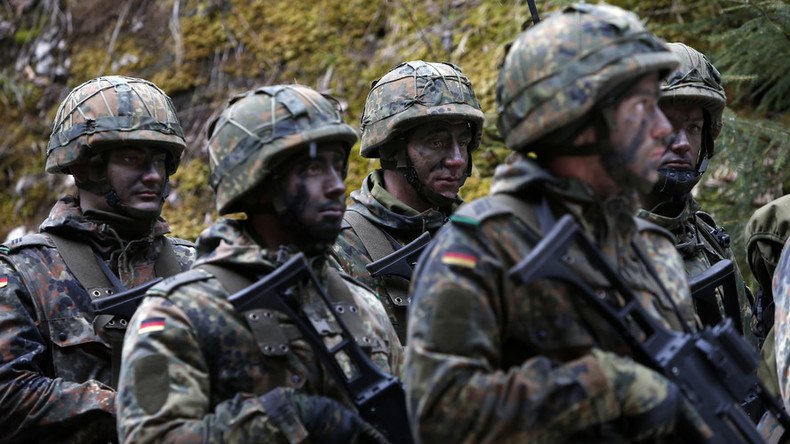Enemy within? German army looking for Islamist infiltrators in its ranks, report says

German Military Intelligence (MAD) is looking into nearly 300 cases of potential extremists, including Islamist infiltrators in its ranks, and is mulling tougher screening for recruits because of the situation, Die Welt reports, citing military sources.
“Currently the MAD is checking a three-digit number of suspected extremists in the armed forces: 268 right-wing extremists, 64 Islamists and six left-wing extremists,” Die Welt reported on Sunday, citing an unnamed military official.
According to the outlet, the MAD has tip-offs about plans to enroll so-called “short-term servicemen” into the German army (Bundeswehr) for them to get proper military training.
The intelligence agency is also reported as saying that so-called “green-on-blue,” or insider, attacks, would be possible in that case.
"Risks by such perpetrators for the military compounds inside and outside the country cannot be excluded in that regard.”
In a bid to counter potential dangers, the Bundeswehr plans to introduce security checks for new recruits via the MAD. According to the plan, extremists, terrorists and criminals should in this way be denied any chance to join the ranks of the army.
A respective bill for changing the “Soldiers Law” should be adopted by the German government next week, Die Welt reports. The army is citing a greater need for the move given the type of the training its soldiers are being subjected to during their service.
"The Bundeswehr trains all its soldiers to use weapons for war,” a draft bill obtained by Die Welt reads. That poses a risk that terrorists “might abuse these skills” for violent acts inside and outside the country.
READ MORE: Berlin sees Turkey as Middle East terrorism hub, refuses to admit it publicly – report
Up until now, only those already enlisted to the Bundeswehr were subjected to the security checks. If adopted, the new measure would result in at least 20,000 screenings annually, causing some €8.2 billion in additional expenditures.
In July, Germany was shaken by multiple attacks across the country. In two of these cases, both committed by migrants, the assailants pledged allegiance to the terrorist organization Islamic State (Formerly known as IS, ISIS/ISIL).
Following the attacks, Bavarian Prime Minister Horst Seehoffer said that “terrorism has arrived in Germany.”
‘Impossible to screen everyone’
Abayomi Azikiwe, editor of the Pan-African News Wire, told RT that the new measures are in line with a recently revealed state defense plan that encourages citizens to provide more support to the German military and to stockpile food in case of a major disaster or an armed attack.
The steps are apparently being out in place to prevent further attacks by Islamic extremists, which the authorities perceive as a key challenge to security.
“It appears from the character of the government statements and, of course, the hysteria that is fostered in the media in Europe that the main threat is coming from Islamist extremism,” he said, noting that, in fact, Germany “has been relatively unscathed” by Islamist attacks “in comparison to France and other nations.”
While the government seems concentrating its efforts on how to tackle radical Islam, there are other areas that can lack its attention, such as sprawling right-wing violence.
“There are four times as many right-wing extremists which they had identified as there’re so-called Islamist extremists and far more right-wing extremists than there are so-called left-wing extremists,” Azikiwe said.
The chance of militants infiltrating army ranks is tightly connected with ongoing migrant crisis, as “there are hundreds of thousands of migrants that are streaming into Europe, south, central and eastern Europe over the last year and a half and it is impossible to screen many of these people,” Azikiwe said, adding that the problem arises when “some [of them] want to join the armed forces.”














